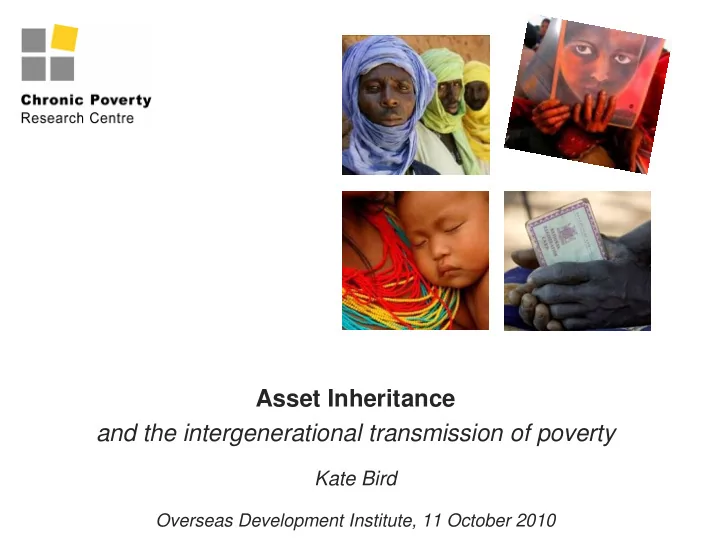

Asset Inheritance and the intergenerational transmission of poverty Kate Bird Overseas Development Institute, 11 October 2010
Introduction • Asset holdings are strongly unequal • Within and between group differences • Between group differences – embeds social difference, long-term implications of class, feudal or colonial systems – address through land reform / dynamic redistribution • Within group differentiation – associated with returns to differential education, effort, investment and luck – compounded by inheritance norms and practices • We will focus on inheritance norms and practices because – importance for ‘the initial conditions’ of the household – make it much easier for asset-rich households to save, invest and accumulate – implications for the intergenerational transmission of poverty
Inheritance matters (1) • Asset inheritance or non- inheritance of assets linked to a person’s poverty trajectory and their likelihood to remain in or move out of chronic poverty – source of social mobility when combined with capabilities and agency – provide collateral for formal sector borrowing – enable investment - including in human capital of next generation – reduce vulnerability to shocks, boosting resilience and limiting adverse coping strategies • Land is major asset in low income developing countries – primary source of wealth, social status, and power – provides the basis for shelter, food, and economic activities – linked to access to water and services (sanitation and electricity – Linked to ability to make long-term investments in land and housing
Inheritance matters (2) • Lack of assets can contribute to poverty being transmitted intergenerationally • Gender = major dimension of differentiation in asset holdings • Women are centrally involved in agriculture and producing food but own only 1-2% of individually titled land • Improvements for women in some areas of their lives not matched in access to land – their security of tenure has declined • Women commonly access land only through their husbands, fathers, brothers or sons – Difficult for women in polygamous marriages, widowed, orphaned, unmarried, separated, divorced or infertile • Does this matter? H’h or extended family will provide for women and children • Not always - male h’h head may not allocate resources to maximise the well-being of all household members
Processes linking inheritance and the IGT of poverty • Discrimination in land ownership and inheritance increases women’s vulnerability to downward mobility on separation, divorce or widowhood • It also limits women’s – power within their household and in wider society – ability to make independent decisions within the household – food security, investments in health and education – status – ability to leverage credit to invest in agriculture or other livelihood activities • The implications for child poverty and the intergenerational transmission of poverty explains the Chronic Poverty Research Centre’s interest in this area
Inheritance and marriage • Women’s lack of land rights influences the conjugal contract (& backstop position) and women’s ability to exercise agency • Dowry, brideprice and transfers to newly married couple – in vivos transfers • Customary/ polygamous marriages – women may have no statutory rights on divorce (including for assets accumulated together) • Separated and divorced women commonly lose housing and productive assets – bridewealth may have to be returned – children may be separated from their mothers and raised the husband and his kin • Locks together with more limited livelihood options – limits to women’s freedom – limits ability to invest in the next generation – particularly for widows & divorced women • Asset grabbing from widows and orphaned children is increasing
Changing policy and practice in a pro-poor way • Unwanted effects of legal reform – Reform does not always help – Land titling can lead to women becoming worse off (examples from Vietnam, Laos, Indonesia, India, Kenya) • Legislation around inheritance and marriage/ divorce need to be reformed together • Anti-discrimination legislation commonly have loopholes allowing application of patriarchal customary practice • Co-registration of land • Combined action to improve statutory law and cultural practice • Complementary improvements needed – gender sensitive legislation and frameworks – the judicial capacity to uphold the delivery of women’s rights – building public awareness and understanding – Integrated implementation
Commissioned research on inheritance and the IGT of poverty • Chronic Poverty Research Centre has commissioned – Annotated bibliographies on inheritance and the IGT of poverty in Africa and Asia, and on property grabbing in SSA – Analysis of inheritance and human capital investments in Bangladesh and Guatemala – Empirical studies of inheritance and the IGT of poverty (India, Ethiopia, Kenya, Uganda, Tanzania, 15 SSA countries) • Dissemination of findings – Today’s Roundtable – all papers and powerpoints in web, plus rapporteur’s report – ODI public meeting (tomorrow) – Series of CPRC working papers – Journal special issue – Policy briefs/ briefing papers
www.chronicpoverty.org Abbie Trayler-Smith/Panos
Recommend
More recommend